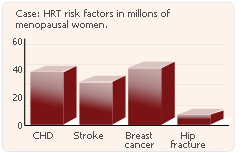
Many treatments are used to treat a variety of menopause symptoms in women approaching a later stage of life. Menopause symptoms result as a significant hormonal imbalance in the later stages of a woman's life. Many women who exhibit some of the 34 symptoms of menopause, which include: night sweats, vaginal dryness, and incontinence, turn to hormone replacement therapy (HRT) for relief. For women experiencing the painful and often embarrassing symptoms of menopause such method of treatment is often an invaluable alternative to phytoestrogenic herbs which are also sometimes used to treat the symptoms of menopause. As an artificial means of tending to the hormone imbalance in the body hormone therapy carries with it a host of dangerous side effects. For this reason women are often discouraged to undergo this artificial means of curbing the symptoms of menopause.

Hormone replacement therapy (HRT) or hormone therapy (HT) as it is called in Britain is used by millions of women all across the world. As previously stated, menopause symptoms are the result of a decreased level of hormones in a woman's body. In response to this, hormone therapy or treatment as it sometimes known as is one option often utilized by women in order to treat such menopausal symptoms. The process of HRT can be delivered in many forms and these include: vaginal rings, gels, tablets, and patches to name a few. The levels of estrogen are delivered in the form of progesterone or progestins referred to as “sequentially combined HRT” or scHRT. The risks of HRT are well documented however and due to such media attention from a flurry of high profile studies, the take up rate of women opting for hormone replacement therapy has fallen significantly in recent years. The most prolific of these studies was Million Women Study, which confirmed findings that those undergoing treatments for HRT suffered from a greater risk of heart attacks, strokes and breast cancer. Other risks from hormone therapy include the increased risk of osteoporosis as a tiny percentage of menopausal women undergoing hormone therapy suffer from severe bone loss.
Hormone therapy works by artificially replacing lost hormones in the bodies of menopausal women. Such a process is often seen as the best method of combating the symptoms of menopause. The benefits of hormone therapy are further strengthened by the many methods in which such treatment can be delivered to the body. Those who undergo such treatment however should be warned of the documented risks. Such risks include a higher chance of contracting serious diseases, such as breast cancer. For this reason the risks of hormonal therapy should be carefully weighed up against the positives before a decision to use such therapy is decided upon.